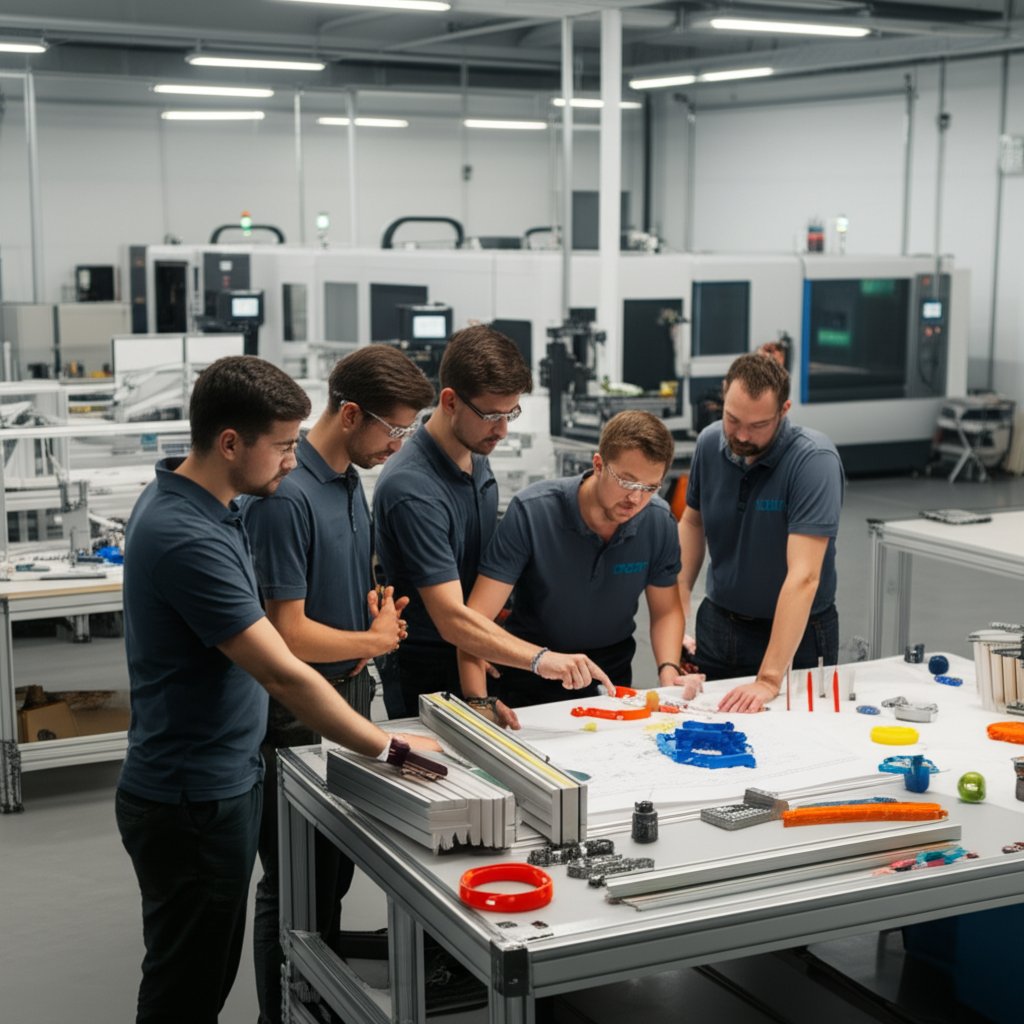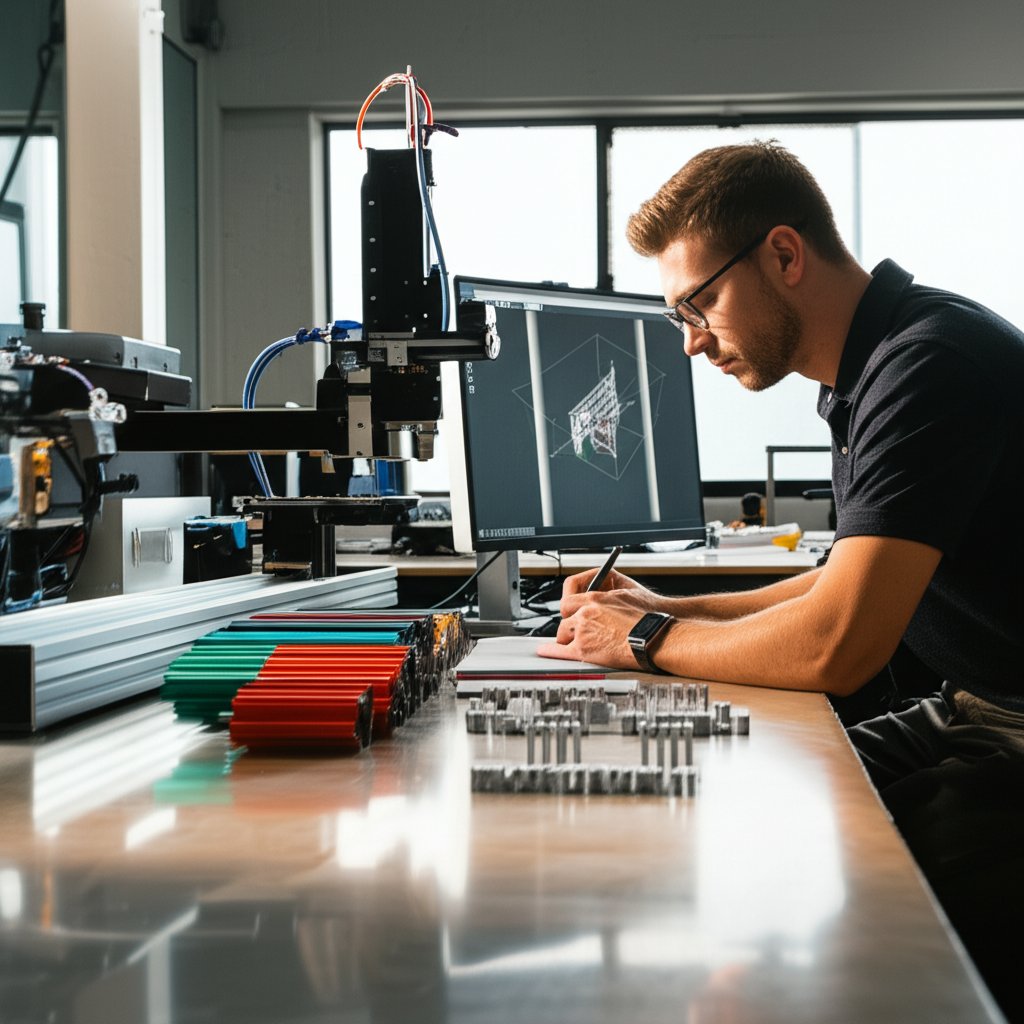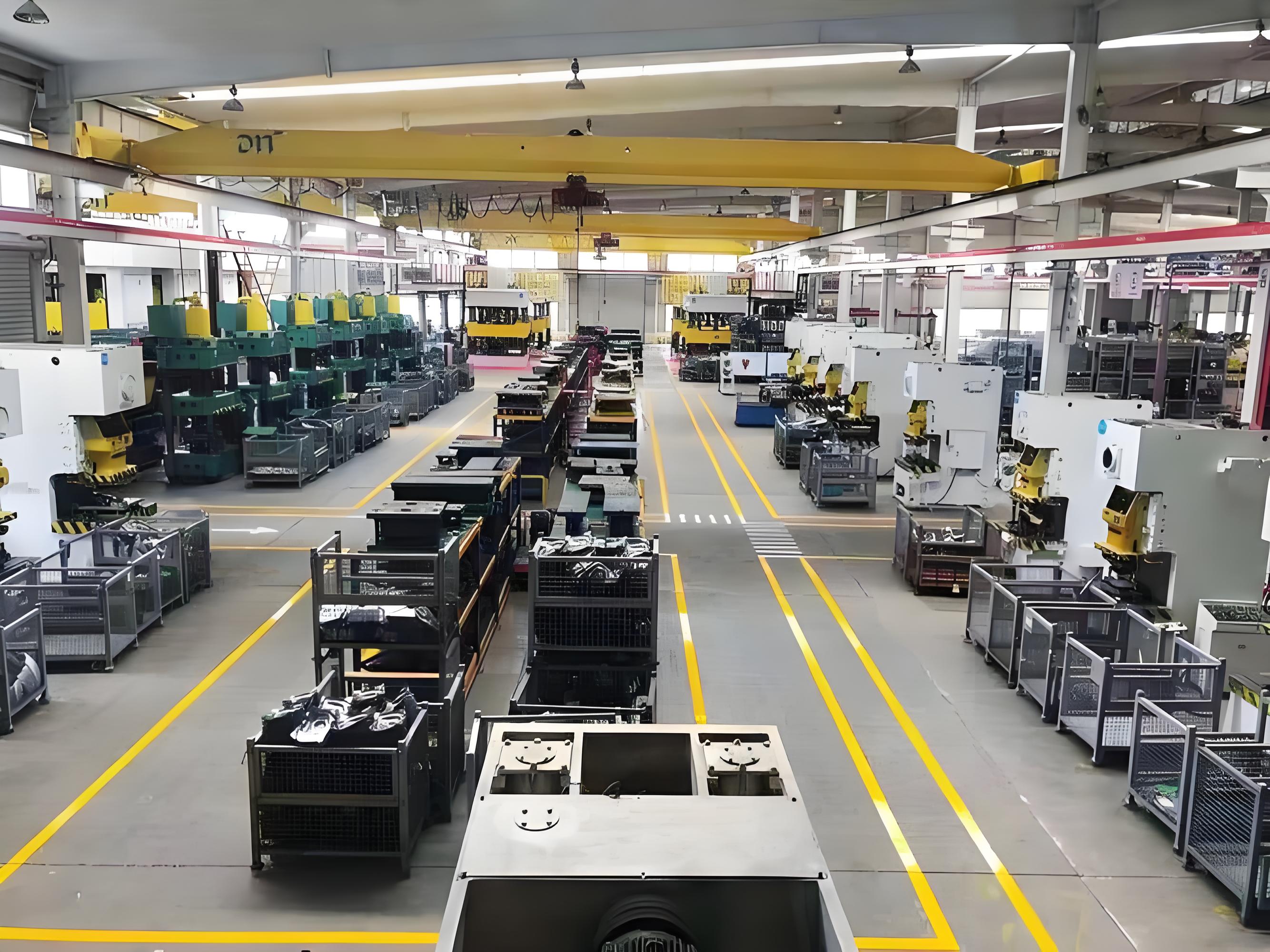একটি নির্ভরযোগ্য ছোট পার্টি অ্যালুমিনিয়াম এক্সট্রুশন প্রস্তুতকারক খুঁজুন—স্থান অনুসারে তালিকাভুক্ত

ছোট পরিমাণ এক্সট্রুশনে সাফল্যের সূচনা মজবুতভাবে করুন
যখন আপনার প্রয়োজন হয় নির্ভুলতা, নমনীয়তা এবং পুনরাবৃত্তিযোগ্য মানের—কিন্তু আপনার কাছে বৃহৎ পরিমাণ উৎপাদনের প্রয়োজন নেই—তখন একটি নির্ভরযোগ্য ছোট পরিমাণ অ্যালুমিনিয়াম এক্সট্রুশন প্রস্তুতকারক খুঁজে পাওয়াটা যেন একটি ল্যাবিরিন্থের মধ্যে দিয়ে পথ খুঁজে বার করার মতো। হয়তো আপনি একজন পণ্য বিকাশকারী, একটি স্টার্টআপ বা একজন ডিজাইন ইঞ্জিনিয়ার যার মাত্র 100 বা 500টি পণ্যের প্রয়োজন, ট্রাকলোড পণ্যের নয়। জটিল শোনাচ্ছে? আপনি একা নন। কাস্টম অ্যালুমিনিয়াম এক্সট্রুশনের দুনিয়া অসংখ্য সম্ভাবনায় ভরা, কিন্তু কম পরিমাণে ক্রেতাদের জন্য এটি জটিলতাও তৈরি করে। এই গাইডটি আপনাকে দিশাহারা অবস্থা থেকে আত্মবিশ্বাসের সঙ্গে সঠিক পছন্দের তালিকায় পৌঁছে দেবে, কার্যকর মানদণ্ড এবং আপনার আদর্শ সহযোগীর দিকে পরিষ্কার পথ নির্দেশ করে।
2025 এর জন্য ছোট পরিমাণ বলতে আসলে কী বোঝায়
ছোট পরিমাণে এক্সট্রুশন শুধুমাত্র কম ন্যূনতম অর্ডার পরিমাণ (MOQs) নিয়ে কাজ করা নয়। এর মানে হলো এমন প্রস্তুতকারকদের সন্ধান যারা স্থিতিশীল মান বজায় রেখে দ্রুত সময়ের মধ্যে সরবরাহ করতে পারে এবং প্রোটোটাইপিং বা নিচ্ছিদ্র উৎপাদনের ক্ষেত্রে সহায়তা প্রদান করে। 2025 সালে, সেরা এ্যালুমিনিয়াম এক্সট্রুশন প্রস্তুতকারকরা হবেন যারা ডিজাইনের নমনীয়তা, দ্রুত মূল্য নির্ধারণ এবং যেসব কাজ সাধারণ বড় পরিমাণে উৎপাদনের ছাঁচে পড়ে না সেগুলো গ্রহণের ইচ্ছাশক্তি প্রদর্শন করতে পারে। আপনার যদি নতুন পণ্য মুক্তির জন্য কাস্টম অ্যালুমিনিয়াম এক্সট্রুশন বা প্রচলিত কোনো সিস্টেমের জন্য বিশেষ পার্ট প্রয়োজন হয়, সঠিক অংশীদার আপনাকে মান কমানো ছাড়াই দ্রুত পরিবর্তন করার সুযোগ দেবে।
ছোট পরিমাণে উৎপাদনের সময় লুকানো খরচ
ধরুন আপনি এমন একটি দরপত্র পেয়েছেন যা দেখতে ভালো লাগছে—কিন্তু হঠাৎ আপনি টুলিংয়ের অতিরিক্ত ফি, অস্পষ্ট সহনশীলতা বা ব্যয়বহুল পোস্ট-প্রসেসিং লক্ষ্য করলেন। ছোট পরিমাণে উৎপাদনের ক্ষেত্রে, এই ধরনের লুকানো খরচ আপনার বাজেটকে দ্রুত ক্ষতিগ্রস্ত করে দিতে পারে। নিম্নলিখিত বিষয়গুলোর প্রতি সতর্ক দৃষ্টি রাখুন:
- আপনার প্রকল্প শুরু করার সময় দীর্ঘ প্রক্রিয়াকরণ সময় বিলম্বিত করে
- অস্পষ্ট বা ঢিলেঢালা সহনশীলতা যা ফিট বা কার্যকারিতা সংক্রান্ত সমস্যা তৈরি করে
- হঠাৎ টুলিং চার্জ বা ব্যয়বহুল ডাই সংশোধন
- বিভক্ত সেকেন্ডারি অপারেশন (যেমন অ্যানোডাইজিং বা মেশিনিং) যা জটিলতা এবং ঝুঁকি বাড়ায়
টুলিংয়ের জন্য অর্থ প্রদানের আগে সরবরাহকারী নির্বাচনের ঝুঁকি কমানোর উপায়
আপনি যখন একটি সরবরাহকারীকে চয়ন করবেন এবং টুলিংয়ে বিনিয়োগ করবেন তখন এই নিম্নলিখিত বিষয়গুলি মূল্যায়নে মনোযোগ দিন:
- ক্ষমতা ম্যাচিং— তারা কি আপনার জ্যামিতি, সংকর ধাতু এবং সমাপ্তির প্রয়োজনীয়তা পূরণ করতে পারে?
- ডাই নীতিমালা— ডাইটি কার সম্পত্তি এবং আপনার পরিবর্তনের প্রয়োজন হলে কী হবে?
- ন্যূনতম পরিমাণ— আপনার রানের আকারের জন্য তাদের MOQs কি বাস্তবসম্মত?
- সমাপ্তি বিকল্প— তারা কি আপনার প্রয়োজনীয় পোস্ট-প্রসেসিং নিজস্ব সুবিধাতেই সরবরাহ করতে পারে?
- স্পন্দনশীলতা— আপনার প্রশ্নগুলির উত্তর তারা কত দ্রুত এবং স্পষ্টভাবে দিতে পারে?
এই গাইডে উল্লিখিত প্রতিটি প্রস্তুতকারককে এই মানদণ্ডের উপর ভিত্তি করে মূল্যায়ন করা হয়েছে, তাই আপনি তুলনা করতে পারেন একে অপরের সঙ্গে— যেটি আপনি প্রোটোটাইপ বা ছোট রানের উৎপাদন অংশের জন্য কাস্টম এক্সট্রুডেড অ্যালুমিনিয়াম খুঁজছেন কিনা তা নির্বিশেষে।
ছোট পার্টের ক্ষেত্রে, সবচেয়ে কম মূল্যের চেয়ে বেশি গুরুত্বপূর্ণ হল শক্তিশালী ক্ষমতা ম্যাচ এবং খোলা যোগাযোগ—বিশেষ করে কাস্টম অ্যালুমিনিয়াম এক্সট্রুশন প্রকল্পগুলির সাথে কাজ করার সময়।
প্রতিটি বিভাগের সুবিধা এবং অসুবিধাগুলি ভাঙা হয়েছে, বাস্তব ব্যবহারের ক্ষেত্র, এবং আপনার RFQ-এ কী চাওয়া উচিত। তুলনা টেবিল এবং চূড়ান্ত পরামর্শ আপনাকে দ্রুত ত্যাগ-গ্রহণ মূল্যায়ন করতে সাহায্য করবে, যাতে আপনি আরও যাচাইয়ের জন্য দুই বা তিনটি প্রার্থী ছোট তালিকাভুক্ত করতে পারেন। পরবর্তী বিভাগগুলিতে আপনি প্র্যাকটিক্যাল অডিট চেকলিস্ট, RFQ প্রম্পট, এক্সট্রুশনের জন্য ডিজাইন টিপস এবং আলোচনার কৌশলও খুঁজে পাবেন। ছোট পার্টের এক্সট্রুশন ল্যান্ডস্কেপ বোঝা শুরু করতে হলে H3 গুলি দেখুন, আপনার প্রয়োজনগুলি তুলনা করুন এবং বিশ্বস্ত অংশীদারদের ছোট তালিকা তৈরি করা শুরু করুন।

ছোট পার্টের ক্রেতা আত্মবিশ্বাসের জন্য আমাদের স্কোরিং পদ্ধতি
আপনি যখন সঠিক অংশীদারের খোঁজে থাকেন, তখন কীভাবে একটি দক্ষ এবং সাড়া দেওয়া দোকানকে ঝুঁকিপূর্ণ অজ্ঞাত থেকে আলাদা করবেন? চলুন মূল্যায়ন প্রক্রিয়াটি ভেঙে ফেলি যাতে আপনি র্যাঙ্কিংগুলোতে আস্থা রাখতে পারেন এবং সেগুলোকে আপনার নিজস্ব কাস্টম এক্সট্রুশন প্রয়োজনীয়তার সঙ্গে খাপ খাওয়াতে পারেন। প্রযুক্তিগত সামঞ্জস্যতা, স্বচ্ছতা এবং দক্ষতার ভিত্তিতে সরবরাহকারীদের মূল্যায়ন করে আপনি অপ্রত্যাশিত ঘটনা এড়াতে পারেন এবং এমন একটি ছোট তালিকা তৈরি করতে পারেন যা আপনার প্রকল্পের সঙ্গে মেলে, যেটাই হোক না কেন আপনার প্রয়োজন— একটি স্ট্যান্ডার্ড প্রোফাইল বা একটি বিশেষ অ্যালুমিনিয়াম এক্সট্রুশন সমাধান।
কম পরিমাণে এক্সট্রুশনের জন্য ক্ষমতা মেলে
প্রথমে নিজেকে জিজ্ঞাস করুন: এই সরবরাহকারী কি আমার জ্যামিতি, খাদ এবং সমাপ্তি পরিচালনা করতে পারে? সব কাস্টম অ্যালুমিনিয়াম এক্সট্রুডার সমান নয়। কিছু সাধারণ আকৃতির ক্ষেত্রে দক্ষতা দেখায়, যেখানে অন্যগুলি জটিল, পাতলা দেয়াল বা বহু-কক্ষযুক্ত প্রোফাইলগুলির উপর মনোনিবেশ করে। তাদের পূর্ববর্তী প্রকল্পগুলি পর্যালোচনা করুন এবং নমুনা পরিদর্শন প্রতিবেদনের জন্য অনুরোধ করুন। শক্তিশালী মিল মানে যে বিক্রেতা পারে:
- আপনার খাদ এবং টেম্পার সমর্থন করুন (6063, 6061, 6005A ইত্যাদি)
- আপনার প্রয়োজনীয় সহনশীলতা এবং পৃষ্ঠ সমাপ্তি পূরণ করুন
- গৃহস্থ দ্বিতীয় পরিচালনা (কাটিং, মেশিনিং, অ্যানোডাইজিং) অফার করুন
- দ্রুত প্রযুক্তিগত প্রতিক্রিয়া এবং DFM পরামর্শ দিয়ে সাড়া দিন
বিশেষ প্রয়োজনের অ্যালুমিনিয়াম এক্সট্রুশন প্রকল্পের জন্য, প্রকৃত নির্মাণ ইস্যুগুলি মোকাবেলার জন্য প্রকৌশল সমর্থনের সাথে প্রাথমিক সহযোগিতা অপরিহার্য। কল্পনা করুন আপনার CAD পর্যালোচনা এবং খরচ ও পুনরাবৃত্তির জন্য অপ্টিমাইজড করা হচ্ছে—এটাই হল আপনি যে ধরনের অংশীদারিত্ব চান।
টুলিং অ্যামোর্টাইজেশন এবং ল্যান্ডেড কস্ট মডেলিং
খরচের স্পষ্টতা অত্যন্ত গুরুত্বপূর্ণ। কখনও কি এমন কোটেশন পেয়েছেন যা প্রথমে কম মনে হয়েছে, কিন্তু পরে লুকানো খরচ খুঁজে পেয়েছেন? কাস্টম এক্সট্রুডেড অ্যালুমিনিয়াম রানের জন্য প্রতি পার্ট খরচ গণনার সঠিক পদ্ধতি হল:
- টুলিং অ্যামোর্টাইজেশন: সূত্রটি ব্যবহার করুন টুলিং_খরচ / পরিমাণ + প্রতি পার্ট পরিবর্তনশীল খরচ আপনার প্রতি ইউনিট দামে ডাই খরচের প্রভাব দেখার জন্য। উদাহরণস্বরূপ, 500টি পণ্যের জন্য 2000 ডলারের ডাই খরচ প্রতি পার্ট শুধুমাত্র টুলিংয়ের জন্য 4 ডলার যোগ করবে।
- স্ট্যাকড অপারেশন: মেশিনিং, অ্যানোডাইজিং এবং প্যাকেজিংয়ের খরচ যোগ করুন। আইটেমাইজড কোটেশন অনুরোধ করুন যাতে আপনি দেখতে পারেন প্রতিটি পদক্ষেপ মোট খরচকে কীভাবে প্রভাবিত করছে।
- ল্যান্ডেড খরচ: চালান, আমদানি শুল্ক বা বিশেষ প্যাকেজিং না ভুলবেন—এগুলি স্থানীয় এবং বিদেশী সরবরাহকারীদের মধ্যে অর্থনৈতিক হিসাবকে পরিবর্তন করে দিতে পারে।
এই উপাদানগুলির মডেলিং করে আপনি হঠাৎ খরচের আঘাত এড়াতে পারবেন এবং অনুমানের পরিবর্তে তথ্যের ভিত্তিতে আলোচনায় অংশ নিতে প্রস্তুত থাকবেন। বিশেষ করে কাস্টম অ্যালুমিনিয়াম এক্সট্রুশন প্রকল্পগুলির ক্ষেত্রে এটি খুবই গুরুত্বপূর্ণ, যেখানে জটিলতা টুলিং এবং প্রক্রিয়াকরণের খরচ উভয়ই বাড়িয়ে দিতে পারে।
অডিট চেকলিস্ট এবং আরএফকিউ টেমপ্লেট
উদ্ধৃতি অনুরোধ করার জন্য প্রস্তুত? তুলনা করার জন্য একটি পুনরাবৃত্তিযোগ্য ওয়ার্কফ্লো ব্যবহার করুন:
- জ্যামিতি, সহনশীলতা এবং প্রয়োজনীয় মিশ্রধাতু/টেম্পার সংজ্ঞায়িত করুন
- সমাপ্তি ধরন এবং দৈর্ঘ্য সহনশীলতা ব্যান্ড নির্দিষ্ট করুন
- ডাই নীতি (মালিকানা, সংরক্ষণ, সংশোধন শর্তাবলী) এবং নমুনা অনুমোদন প্রক্রিয়া অনুরোধ করুন
- এমওকিউ এবং বিভক্ত-চালান বিকল্পগুলি সামঞ্জস্য করুন
- প্রথম-নিবন্ধ গ্রহণযোগ্যতা মানদণ্ড এবং নথিপত্রে সম্মতি জানান
কারখানা যাচাইয়ের জন্য, আপনার চেকলিস্ট তৈরি করুন:
- মান সার্টিফিকেশন (ISO 9001, IATF 16949 ইত্যাদি)
- নমুনা পরিদর্শন প্রতিবেদন এবং প্রক্রিয়া ক্ষমতা তথ্য
- PPAP বা প্রথম অফ অনুমোদন পদ্ধতি
এই পদক্ষেপগুলি আপনাকে সতর্ক করে দেয় - যেমন অস্পষ্ট মানের দাবি বা নথিভুক্তি অনুপস্থিতি - যখন আপনি একটি সরবরাহকারীকে নির্ধারণ করেন।
সিদ্ধান্ত ম্যাট্রিক্স: স্কোর এবং আত্মবিশ্বাসের সাথে তুলনা করুন
আপনার চূড়ান্ত শর্টলিস্ট তৈরি করতে, কী কী বিষয়ে বিক্রেতাদের তুলনা করতে একটি সাধারণ ওজনযুক্ত টেবিল ব্যবহার করুন:
| ক্রিটেরিয়া | ওজন |
|---|---|
| অপেক্ষাকাল | 25% |
| MOQ নমনীয়তা | 20% |
| ফিনিশিং অপশন | 15% |
| প্রকৌশল সমর্থন | 20% |
| যোগাযোগ | 20% |
আপনার স্কোরগুলি পূরণ করুন এবং ওজনযুক্ত মোট আপনার পরবর্তী পদক্ষেপগুলি পরিচালিত করুন।
ছোট পার্টির জন্য, ডাই-চেঞ্জ চাপগুলি এবং নিজস্ব দ্বিতীয় অপারেশনগুলি প্রায়শই সামান্য কম কাঁচা এক্সট্রুশন মূল্যকে হারায়।
গঠনমূলক পদ্ধতির সাথে, আপনি আত্মবিশ্বাসের সাথে এগিয়ে যাওয়ার প্রস্তুতি নেবেন - যেটি আপনি মান সমাধান বা সত্যিকারের বিশেষ অ্যালুমিনিয়াম এক্সট্রুশনের সন্ধান করছেন না কেন। পরবর্তীতে, আমরা নির্দিষ্ট প্রস্তুতকারকের পছন্দগুলি দেখব এবং কীভাবে তারা অটোমোটিভ, প্রোটোটাইপিং এবং বিশেষ প্রয়োজনীয়তার জন্য উপযুক্ত।
শাওয়ি মেটাল পার্টস সাপ্লায়ার
কম ভলিউম অটো অ্যাপ্লিকেশনের জন্য কোর শক্তি
যখন ছোট চালানের জন্য অটোমোটিভ-স্তরের মানের প্রয়োজন হয়, তখন শাওয়ি মেটাল পার্টস সাপ্লায়ার কাস্টম অ্যালুমিনিয়াম এক্সট্রুশন প্রস্তুতকারকদের মধ্যে শীর্ষ পছন্দ হিসাবে প্রতিষ্ঠিত হয়। কল্পনা করুন একটি নতুন EV ব্র্যাকেট বা অভ্যন্তরীণ ট্রিম চালু করছেন - গতি এবং নির্ভুলতা গুরুত্বপূর্ণ, কিন্তু খরচ এবং নমনীয়তাও তেমনি গুরুত্বপূর্ণ। শাওয়ির এক-স্টপ সমাধানটি কাঁচা এক্সট্রুশন থেকে শুরু করে মেশিনিং এবং ফিনিশিং পর্যন্ত প্রতিটি পদক্ষেপকে একটি ছাদের নীচে সম্পূর্ণ করে। এই একীভূত পদ্ধতির ফলে আপনি পাবেন:
- উত্পাদনযোগ্যতা এবং পুনরাবৃত্তিযোগ্যতার জন্য আপনার ডিজাইন অপ্টিমাইজ করার জন্য সহজাত প্রকৌশল সহযোগিতা
- অভ্যন্তরীণ সেকেন্ডারি অপারেশন - সিএনসি মেশিনিং, অ্যানোডাইজিং, পাউডার কোটিং - যা মান এবং সময়সূচীকে সমান্তরালে রাখে
- নমনীয় MOQ এবং দ্রুত প্রোটোটাইপিং সমর্থন, যাতে আপনি ডিজাইন যাচাই করতে পারবেন বা নতুন অংশ পরীক্ষা চালাতে পারবেন বড় পরিসরের আয়তন ছাড়াই
- অটোমোটিভ-নির্দিষ্ট মান নিয়ন্ত্রণ, IATF 16949 সার্টিফিকেশন এবং কঠোর প্রক্রিয়া নথিভুক্তিসহ
যেসব ক্রেতারা নির্ভরযোগ্য কাস্টম অ্যালুমিনিয়াম এক্সট্রুশন প্রস্তুতকারক খুঁজছেন, এই স্তরের একীভূতকরণ এবং যত্ন ছোট ব্যাচের প্রকল্পগুলিকে প্রায়শই ক্ষতিগ্রস্ত করে এমন দেরিতে, ভুল বোঝাবুঝি এবং অসঙ্গতিপূর্ণ ফিনিশগুলির ঝুঁকি কমাতে সাহায্য করে
ক্রেতাদের জন্য সুবিধা এবং অসুবিধাগুলি
সুবিধাসমূহ
- একীভূত ফিনিশিং এবং মেশিনিং - একাধিক বিক্রেতাকে সমন্বয় করার প্রয়োজন নেই
- দ্রুত DFM (ডিজাইন ফর ম্যানুফ্যাকচারেবিলিটি) প্রতিক্রিয়া যাতে সমস্যাগুলি তাড়াতাড়ি ধরা পড়ে
- নমনীয় ন্যূনতম অর্ডার পরিমাণ এবং দ্রুত নমুনা প্রত্যাবর্তন
- দীর্ঘমেয়াদী শান্তিতে ডাই মালিকানা এবং সংরক্ষণের উপর পরিষ্কার নীতিমালা
- অটোমোটিভ-গ্রেড প্রক্রিয়া নিয়ন্ত্রণ এবং ট্রেসেবিলিটি
অভিব্যক্তি
- উচ্চ-বিশেষায়িত বিমান ও মহাকাশ খাদ অতিরিক্ত যোগ্যতা বা নিশ্চিতকরণের প্রয়োজন হতে পারে
- জটিল, বহু-অপারেশন যুক্ত পার্টসের জন্য লিড সময় সাধারণ এক্সট্রুশনের চেয়ে বেশি হতে পারে
আদর্শ ব্যবহারের ক্ষেত্র এবং RFQ টিপস
আপনি কি ভাবছেন কোথায় Shaoyi এর দক্ষতা? যেসব অ্যাপ্লিকেশনে ফাংশন এবং ফিনিশ উভয়ের জন্য গুরুত্বপূর্ণ সেখানে আপনি পার্থক্য লক্ষ্য করবেন। জনপ্রিয় ছোট ব্যাচ প্রকল্পগুলির মধ্যে রয়েছে:
- EV এবং হাইব্রিড যানগুলির জন্য ব্র্যাকেট এবং মাউন্টিং রেলগুলি
- গার্ড, হিট-সিঙ্ক প্রোফাইল এবং ইলেকট্রনিক্স হাউজিং
- যেখানে সৌন্দর্য সামঞ্জস্য গুরুত্বপূর্ণ দরজা এবং জানালা ট্রিম
- পাইলট নির্মাণ বা সীমিত সংস্করণের জন্য কাস্টম কাঠামোগত উপাদান
আপনার RFQ থেকে সর্বোচ্চ উপকৃত হওয়ার জন্য, এই প্রম্পটগুলি বিবেচনা করুন:
- নমুনা অনুমোদন এবং প্রথম নিবন্ধ পরিদর্শন রিপোর্ট অনুরোধ করুন
- দৈর্ঘ্য সহনশীলতা ব্যান্ড এবং অ্যানোডাইজিং পুরুতা প্রয়োজনীয়তা নির্দিষ্ট করুন
- ডাই মালিকানা, সংরক্ষণ এবং পরিবর্তন নীতি সম্পর্কে জিজ্ঞাসা করুন
- ছোট রান স্কিডিউলিং নমনীয়তা এবং বিভক্ত-শিপমেন্ট বিকল্পগুলি পরিষ্কার করুন
অটোমোটিভ-গ্রেড, ছোট-ব্যাচ এক্সট্রুশনের জন্য একটি সরাসরি পথের জন্য অনুসন্ধান করুন অ্যালুমিনিয়াম এক্সট্রুশন অংশ শাওয়ি মেটাল পার্টস সরবরাহকারীর কাছ থেকে - চীনের অগ্রণী একীভূত নির্ভুল অটো মেটাল পার্টস সমাধান প্রদানকারী। তাদের প্ল্যাটফর্মটি ছোট ব্যাচ ক্রেতাদের জন্য তৈরি করা হয়েছে যারা সাধারণত বৃহত্তর প্রোগ্রামগুলির জন্য সংরক্ষিত থাকা পরিশ্রম, নথিভুক্তি এবং নমনীয়তা চান।
কাস্টম অ্যালুমিনিয়াম এক্সট্রুশন প্রস্তুতকারকদের মধ্যে বেছে নেওয়ার সময়, এমন অংশীদারদের অগ্রাধিকার দিন যারা প্রকল্পের সমর্থন, প্রতিক্রিয়াশীল প্রকৌশল এবং স্বচ্ছ নীতিগুলি সরবরাহ করে - এই কারকগুলি আপনার প্রকল্পটিকে ঝুঁকি থেকে অনেক বেশি দূরে রাখবে কেবলমাত্র শিরোনাম মূল্যের চেয়ে।
পরবর্তীতে, আমরা একটি প্রোটোটাইপিং-ফোকাসড দোকানের দিকে আলোকপাত করব যা আপনার উত্পাদন পরিমাণ বাড়ানোর আগে দ্রুত পুনরাবৃত্তি এবং ডিজাইন নমনীয়তা প্রয়োজন হলে আদর্শ।

প্রোটোটাইপ-ফোকাসড ছোট রান এক্সট্রুশন শপ
কেন প্রোটোটাইপ এবং প্রথম নিবন্ধগুলিতে এটি দক্ষ
যখন আপনি একটি ডিজাইন যাচাই করার জন্য দৌড়াচ্ছেন, তখন কোনো সরবরাহকারীর কাছ থেকে সাড়া পেতে সপ্তাহ অপেক্ষা করা বা উচ্চ ন্যূনতম পরিমাণ অর্ডারের দাবি করা প্রগতি ধীরে করে দেয়। ধরুন আপনি একটি নতুন আবরণ বা কাস্টম ব্রাকেট তৈরি করছেন—প্রতিটি ছোট পরিবর্তন গুরুত্বপূর্ণ এবং গতি অত্যন্ত প্রয়োজনীয়। এখানেই প্রোটোটাইপ অ্যালুমিনিয়াম এক্সট্রুশন বিশেষজ্ঞদের দক্ষতা প্রকাশ পায়। এই ধরনের দোকানগুলি দ্রুততা নিয়ে তৈরি করা হয়েছে: তারা কম MOQ গ্রহণ করে, দ্রুত ডাই সাইকেল সরবরাহ করে এবং এক্সট্রুশনকে অভ্যন্তরীণ CNC মেশিনিং বা অন্যান্য পদ্ধতির সাথে সংযুক্ত করে দ্রুত চূড়ান্ত নমুনা সরবরাহ করতে পারে।
পারম্পারিক উচ্চ-পরিমাণ এক্সট্রুডারের বিপরীতে, প্রোটোটাইপ-নির্ভর সরবরাহকারী এমনভাবে গঠিত হয় যা একক (one-off) বা সংক্ষিপ্ত চালানের কাজকে সমর্থন করে, যা কার্যকর প্রোটোটাইপ, ফিক্সচার এবং প্রথম আর্টিকেল নির্মাণের জন্য আদর্শ। কোনো নতুন ক্রস-সেকশন পরীক্ষা করা বা মাউন্টিং বৈশিষ্ট্যগুলি পরিমার্জন করার প্রয়োজন হলে আপনি লক্ষ্য করবেন তারা অন্যত্র প্রচলিত লাল ফিতা বা দীর্ঘ বিলম্ব ছাড়াই ক্রমবর্ধমান ডিজাইন পরিবর্তনগুলি গ্রহণ করতে প্রস্তুত।
ডিজাইন দলের জন্য সুবিধা এবং অসুবিধাগুলি
সুবিধাসমূহ
- দ্রুত নমুনা সংগ্রহ এবং সংক্ষিপ্ত লিড সময় - মাসের পরিবর্তে দিনে আপনার প্রোটোটাইপ অ্যালুমিনিয়াম এক্সট্রুশন পান
- নিম্ন বা কোনো ন্যূনতম অর্ডার পরিমাণ নেই - মিনিয়েচার এক্সট্রুশন এবং পরীক্ষামূলক চালানোর জন্য আদর্শ
- নমনীয় ডাই সংশোধন নীতি - উৎপাদন সরঞ্জাম চূড়ান্ত করার আগে জ্যামিতির উপর পুনরাবৃত্তি করা সহজ
- অভিন্ন পোস্ট-প্রসেসিং - সিএনসি মেশিনিং, ড্রিলিং বা হালকা সমাপ্তি এক ছাদের নিচে পরিচালিত হয়
অভিব্যক্তি
- বড় পরিসরের এক্সট্রুডারের তুলনায় খাদ এবং সমাপ্তির সংক্ষিপ্ত নির্বাচন
- উচ্চ পরিমাণে কম খরচ দক্ষতা - ছোট অ্যালুমিনিয়াম এক্সট্রুশন এবং প্রি-প্রোডাকশন পর্যায়ের জন্য সবচেয়ে উপযুক্ত
- কঠোর নিয়ন্ত্রক অনুপালনের প্রয়োজন হলে নথিভুক্তি বা শংসাপত্রের সম্ভাব্য সীমাবদ্ধতা
ব্যবহারের ক্ষেত্র এবং আরএফকিউ পরামর্শ
প্রোটোটাইপ এক্সট্রুশন দোকানগুলি সবচেয়ে ভালোভাবে কাজ করে যখন আপনি নিম্নলিখিতগুলির মধ্য দিয়ে কাজ করছেন:
- ডিজাইন যাথার্থ্য চালানো - ফিট, কার্যকারিতা এবং সমাবেশের উপর দ্রুত পুনরাবৃত্তি করা
- কার্যকরী প্রোটোটাইপ - উৎপাদন-উদ্দেশ্য জ্যামিতি দিয়ে প্রকৃত পরিবেশে প্রদর্শন পরীক্ষা করুন
- ফিক্সচার এবং পাইলট অ্যাসেম্ব্লিস - পূর্ণ-স্কেল টুলস তৈরির আগে তৈরি করুন এবং পরিমার্জন করুন
আপনার RFQ থেকে সর্বোচ্চ উপকৃত হতে, এই টিপসগুলি বিবেচনা করুন:
- পরীক্ষামূলক চলার সময় এবং নমুনা স্বাক্ষর পদ্ধতি সম্পর্কে অনুরোধ করুন
- জিজ্ঞাসা করুন যে তারা কি পূর্ণ উৎপাদন মুক্তির আগে ধাপে ধাপে ঢালাই সংশোধন করার সমর্থন করে
- আপনার পৃষ্ঠতল সমাপ্তি লক্ষ্যগুলি প্রারম্ভেই নির্দিষ্ট করুন - অ্যানোডাইজিং, পাউডার কোটিং বা মেশিনিং দাগগুলি প্রাথমিকভাবে পরিষ্কার করে অপ্রত্যাশিত বিষয়গুলি এড়ান
- পরীক্ষা করুন যে তারা কি অন্যান্য প্রক্রিয়াগুলি (সিএনসি, ড্রিলিং, খোদাই) সহ এক্সট্রুশন একত্রিত করতে পারে সম্পূর্ণ অংশের জন্য
প্রতিরক্ষমূলক যোগাযোগ হল চাবি। যদি আপনি আপনার ছোট অ্যালুমিনিয়াম এক্সট্রুশনগুলিতে কঠোর সহনশীলতা বা একক সমাপ্তি লক্ষ্য করে থাকেন, তাহলে বিস্তারিত চিত্রগুলি সরবরাহ করুন এবং আপনার অনুরোধে গুরুত্বপূর্ণ বৈশিষ্ট্যগুলি হাইলাইট করুন।
প্রোটোটাইপ-কেন্দ্রিক এক্সট্রুশন শপগুলি আদর্শ হয় যখন আপনার জ্যামিতি এখনও পরিবর্তিত হচ্ছে এবং গতি চূড়ান্ত একক খরচের চেয়ে বেশি গুরুত্বপূর্ণ। এগুলি আপনাকে দ্রুত ধারণা থেকে বাস্তবতায় পৌঁছাতে সাহায্য করে—যাতে আপনি পুনরাবৃত্তি করতে পারেন, শিখতে পারেন এবং আত্মবিশ্বাসের সাথে চালু করতে পারেন।
প্রোটোটাইপিং থেকে উৎপাদনে যেতে প্রস্তুত? পরবর্তীতে, আমরা কাস্টম এক্সট্রুডারগুলি অনুসন্ধান করব যা অটোমোটিভ এবং শিল্প প্রোগ্রামগুলির জন্য তৈরি করা হয়েছে যেখানে কঠোর প্রক্রিয়া নিয়ন্ত্রণ এবং স্কেলযোগ্য ক্ষমতার প্রয়োজন।
গ্লোবাল অটোমোটিভ-গ্রেড কাস্টম এক্সট্রুডার
ছোট ব্যাচের জন্য অটোমোটিভ প্রস্তুতি
যখন আপনি অটোমোটিভ বা শিল্প প্রয়োগের জন্য একটি ছোট পরিমাণে পণ্য উৎপাদনের প্রোগ্রাম চালান, আপনার কেবল একজন সরবরাহকারীর বেশি কিছু দরকার—আপনার দরকার এমন একজন অংশীদারের যার নিয়মতান্ত্রিক পদ্ধতি, পরিমাণ অনুযায়ী উৎপাদন ক্ষমতা এবং প্রমাণিত রেকর্ড রয়েছে। একটি সার্ভিস পার্টস ক্যাম্পেইন শুরু করা বা একাধিক দেশে পণ্য চালু করার কথা কল্পনা করুন। এটি কি কঠিন মনে হচ্ছে? এই ধরনের পরিস্থিতিতে বিশ্বব্যাপী কাস্টম অ্যালুমিনিয়াম এক্সট্রুশন কোম্পানিগুলি প্রকৃতপক্ষে উজ্জ্বলতা দেখায়। তাদের পরিণত মান নিয়ন্ত্রণ ব্যবস্থা, শক্তিশালী নথিভুক্তকরণ এবং স্থিতিশীল সময়সূচি প্রক্রিয়াগুলি আপনাকে অপ্রত্যাশিত ঘটনা এড়াতে এবং আপনার সরবরাহ চেইনটি সঠিক পথে রাখতে সাহায্য করে, যদিও অর্ডারের পরিমাণ পরিবর্তিত হয় বা প্রয়োজনীয়তা পরিবর্তিত হয়।
শীর্ষস্থানীয় অ্যালুমিনিয়াম এক্সট্রুশন কোম্পানিগুলি সাধারণত আইএসও 9001 সার্টিফিকেশন বেসলাইন হিসাবে ধরে রাখে, অনেকগুলির কাছে বিশেষায়িত প্রয়োজনীয়তার জন্য আইএটিএফ 16949 (অটোমোটিভ) বা এমনকি এএস9100 (বিমানপথ) সার্টিফিকেশনও থাকে। এই সার্টিফিকেশনগুলি নিশ্চিত করে যে তাদের প্রক্রিয়াগুলি নথিভুক্ত, অডিট করা এবং ক্রমাগত উন্নত হয়, আপনাকে নিশ্চয়তা দেয় যে আপনার পার্টগুলি প্রতিটি ব্যাচে নির্দিষ্টকরণ পূরণ করবে। একাধিক কারখানা বা অঞ্চলজুড়ে স্থিতিশীলতা হল একটি নির্ভরযোগ্য এক্সট্রুডেড অ্যালুমিনিয়াম কোম্পানির প্রধান বৈশিষ্ট্য, যা ক্রেতাদের জন্য একটি ভালো ম্যাচ হয়ে ওঠে যারা মানের অবচয় বা মেয়াদ মতো বিষয়গুলি সহ্য করতে পারবেন না।
বৈশ্বিক ক্রেতাদের জন্য সুবিধা এবং অসুবিধাগুলি
সুবিধাসমূহ
- অবস্থানগুলি জুড়ে স্থিতিশীল মান এবং নথিভুক্তকরণ
- বৃহৎ খাদ এবং প্রোফাইল উপলব্ধতা - বিভিন্ন অটোমোটিভ এবং শিল্প প্রয়োজনীয়তা সমর্থন করে
- বহু-দেশের প্রোগ্রামগুলির জন্য স্থিতিশীল সময়সূচি এবং যোগাযোগ সমর্থন
- পরিপক্ক মান ব্যবস্থাপনা পদ্ধতি (আইএসও/আইএটিএফ/এএস9100)
- চাহিদা বৃদ্ধির সাথে সাথে বৃদ্ধি পাওয়ার ক্ষমতা, সরবরাহকারী পরিবর্তন না করেই
অভিব্যক্তি
- নির্দিষ্ট কাস্টম প্রোফাইলে উচ্চতর ন্যূনতম অর্ডার পরিমাণ (এমওকিউ) হতে পারে
- গঠনমূলক উৎপাদন পরিকল্পনার কারণে ডাই-পরিবর্তন জানালায় কম নমনীয়তা
- ছোট স্থানীয় দোকানগুলির তুলনায় বেসলাইন মূল্য বেশি হতে পারে—বিশেষ করে সরল বা একক প্রকল্পের জন্য
সেরা ফিট প্রকল্প এবং আরএফকিউ প্রম্পটস
গ্লোবাল কাস্টম অ্যালুমিনিয়াম এক্সট্রুশন কোম্পানি নিম্নলিখিতগুলির জন্য আদর্শ:
- পুনরাবৃত্ত মান প্রয়োজন এমন সার্ভিস পার্টস এবং পরবর্তী বাজারের কিটস
- বহু-দেশের পণ্য লঞ্চ যেখানে নথিপত্র এবং প্রক্রিয়া নিয়ন্ত্রণ অত্যন্ত গুরুত্বপূর্ণ
- দীর্ঘমেয়াদী সরবরাহ এবং ট্রেসেবিলিটির প্রয়োজনীয়তা সহ শিল্প সংযোজন
আপনার আরএফকিউ প্রস্তুতির সময়, মূল্য সর্বাধিক করতে এবং ঝুঁকি কমাতে এই টিপস বিবেচনা করুন:
- ডাই মালিকানা ধারা সম্পর্কে জিজ্ঞাসা করুন—টুলিংয়ের মালিক কে, এবং সংশোধনের শর্তাবলী কী কী?
- কনসাইনমেন্ট ডাই বিকল্পগুলি সম্পর্কে জিজ্ঞাসা করুন—পুনরায় অর্ডারের জন্য আপনার ডাই কি সংরক্ষিত এবং পরিচালিত হতে পারে?
- স্প্লিট-শিপমেন্ট সময়সূচি অনুরোধ করুন - কি পর্যায়ক্রমে ডেলিভারির মাধ্যমে নগদ প্রবাহ উন্নত করার জন্য সরবরাহকারী সমর্থন করে?
- একটি নমুনা পরিদর্শন টেমপ্লেট এবং বিস্তারিত প্রথম-নিবন্ধন অনুমোদন পরিকল্পনা অনুরোধ করুন যাতে পরিষ্কার গ্রহণযোগ্যতা মানদণ্ড নির্ধারণ করা যায়
অনুশাসিত মান ব্যবস্থা এবং স্কেলযোগ্য ক্ষমতা বৈশ্বিক প্রোগ্রামগুলোর জন্য কম মাথাব্যথা তৈরি করে কিন্তু মূল মূল্যের সাথে যোগাযোগের গতি এবং প্রকৌশল সমর্থনের তুলনা করে নিন যাতে সর্বোত্তম মিল পাওয়া যায়।
আপনি যখন আপনার সংক্ষিপ্ত তালিকা মূল্যায়ন করবেন, তখন বিবেচনা করুন প্রতিটি এক্সট্রুডেড অ্যালুমিনিয়াম প্রতিষ্ঠান কীভাবে প্রক্রিয়া নিয়ন্ত্রণ, নমনীয়তা এবং সাড়া দেওয়ার ক্ষমতার ভারসাম্য রক্ষা করে। পরবর্তীতে, আমরা বিশেষ এক্সট্রুডারদের দিকে দৃষ্টিপাত করব যারা চাহিদাপূর্ণ কাঠামোগত অ্যাপ্লিকেশনের জন্য উচ্চ-শক্তি সম্পন্ন খাদ উৎপাদনে মনোনিবেশ করেছে - যা পারফরম্যান্স এবং সহনশীলতা অপরিহার্য হলে আদর্শ।

উচ্চ শক্তি সম্পন্ন 7075 বিশেষ এক্সট্রুডার
পারফরম্যান্স পার্টসের জন্য শক্তি নির্ভর ক্ষমতা
যখন আপনার কাছে গঠনমূলক সত্যতা প্রয়োজন যা কঠোরতম পরিবেশের মুখোমুখি হতে পারে—চিন্তা করুন ইউভিউ ফ্রেম, মোটরস্পোর্ট ব্রাকেট বা এয়ারোস্পেস-সংলগ্ন ফিক্সচার—সাধারণ এক্সট্রুশনগুলি কেবল কার্যকর হবে না। কল্পনা করুন এমন একটি অংশের কথা যেখানে প্রতিটি গ্রাম গুরুত্বপূর্ণ, এবং ব্যর্থতা কোনও বিকল্প নয়। ঠিক তখনই একটি বিশেষায়িত দোকানের উপর দৃঢ় নজর দেওয়া আবশ্যিক হয়ে ওঠে যা কেবলমাত্র 7075 অ্যালুমিনিয়াম এক্সট্রুশন এর দিকে মনোনিবেশ করে। কেন? কারণ 7075 হল একটি দস্তা-অ্যালুমিনিয়াম খাদ যা উচ্চ ক্লান্তি প্রতিরোধ এবং শক্তির জন্য পরিচিত, যা মাইল্ড ইস্পাতের সমান হয়ে থাকে তবুও অনেক হালকা থাকে।
এই বিশেষায়িত এক্সট্রুডারগুলি শুধুমাত্র সঠিক খাদ নয়—এগুলি নিয়ন্ত্রিত প্রক্রিয়া, সতর্ক শস্য গঠন পরিচালন এবং পারদর্শী তাপ চিকিৎসা সরবরাহ করে। আপনি পার্থক্যটি লক্ষ্য করবেন এমন অ্যাপ্লিকেশনগুলিতে যেখানে যান্ত্রিক বৈশিষ্ট্য এবং জ্যামিতিক নির্ভুলতা উভয়ই অপরিহার্য। উদাহরণ স্বরূপ, অ্যালুমিনিয়াম বিমান এক্সট্রুশন প্রোফাইলগুলি কঠোর সহনশীলতা এবং কার্যকারিতা মানদণ্ড পূরণ করতে হবে, প্রায়শই কাস্টম আকৃতি এবং কঠোর পরীক্ষা প্রয়োজন হয়।
সুবিধা এবং অসুবিধাগুলি যখন সহনশীলতা এবং খাদ সবচেয়ে বেশি গুরুত্বপূর্ণ হয়
সুবিধাসমূহ
- 7075 এবং 2024 এর মতো উচ্চ-শক্তি সম্পন্ন খাদ দিয়ে গভীর অভিজ্ঞতা
- কঠোর সহনশীলতা এবং স্থিতিশীল পুনরাবৃত্তি সহ সূক্ষ্ম অ্যালুমিনিয়াম এক্সট্রুশন ক্ষমতা
- আদর্শ যান্ত্রিক বৈশিষ্ট্যের জন্য শস্য গঠন এবং তাপ চিকিত্সার বিষয়ে বিশেষজ্ঞতা
- গাঠনিক, মহাকাশযান বা মোটর প্রতিযোগিতার মতো চাহিদাপূর্ণ অ্যাপ্লিকেশনগুলি সমর্থনের ক্ষমতা
অভিব্যক্তি
- সীমিত সমাপ্তি প্যালেট—সাধারণ পার্লার বা বিশেষ সমাপ্তির তুলনায় কম সৌন্দর্য বা বিশেষ সমাপ্তি অফার করতে পারে
- দীর্ঘতর লিড সময়, বিশেষ করে বিশেষ টেম্পার বা কাস্টম পরীক্ষার প্রয়োজনীয়তার জন্য
- উন্নত প্রক্রিয়া নিয়ন্ত্রণ এবং উপকরণ নির্বাচনের কারণে সম্ভাব্য উচ্চ খরচ
ব্যবহারের ক্ষেত্র এবং RFQ নির্দেশিকা
তাহলে, কখন একটি উচ্চ-শক্তি বিশেষ এক্সট্রুডার নির্বাচন করা যুক্তিযুক্ত? নিম্নলিখিত পরিস্থিতিগুলি বিবেচনা করুন:
- ওজন-শক্তি অনুপাত সমালোচনামূলক যেখানে UAV এবং ড্রোন উপাদান
- উচ্চ ফ্যাটিগ প্রতিরোধের প্রয়োজনীয়তা সহ মোটরস্পোর্ট ব্র্যাকেট এবং চ্যাসিস অংশসমূহ
- স্ট্রাকচারাল রেল এবং এয়ারোস্পেস-সংশ্লিষ্ট ফিক্সচার যা নিরবচ্ছিন্ন সহনশীলতা প্রয়োজন
- নিরাপত্তা-সম্পর্কিত বা উচ্চ-চাপযুক্ত পরিবেশের জন্য নির্ভুল অ্যালুমিনিয়াম এক্সট্রুশন প্রোফাইল
একটি নির্ভুল এবং কার্যকর কোটেশন পেতে, আপনার RFQ-এ নিম্নলিখিত বিস্তারিত অন্তর্ভুক্ত করুন:
- যান্ত্রিক বৈশিষ্ট্যের লক্ষ্য (টেনসাইল, ইয়েল্ড, ফ্যাটিগ শক্তি) উল্লেখ করুন
- তাপ চিকিত্সা প্রয়োজনীয়তা এবং এক্সট্রুশনের পরে যেকোনো প্রক্রিয়া বিস্তারিতভাবে উল্লেখ করুন
- যদি প্রয়োজন হয় তবে অ-ধ্বংসাত্মক পরীক্ষা (NDT) বা বিশেষ পরিদর্শন প্রোটোকল অনুরোধ করুন
- আপনার জ্যামিতির জন্য এক্সট্রুশন প্রেস টনেজ এবং সর্বোচ্চ প্রোফাইল এনভেলপ পরিষ্কার করুন
শক্তি-প্রাধান্য শপগুলি প্রায়শই দীর্ঘতর লিড সময় নেয়, কিন্তু সমালোচনামূলক বৈশিষ্ট্য এবং পুনরাবৃত্তিযোগ্যতার উপর তাদের ফোকাস আপনার নিরাপত্তা-সম্পর্কিত ডিজাইনটি যথাযথভাবে কার্যকর করে—প্রতিটি ব্যাচের পর প্রতিটি ব্যাচের জন্য।
আপনি যখন আপনার শর্টলিস্ট মূল্যায়ন করবেন, তখন মনে রাখবেন যে সঠিক বিশেষ এক্সট্রুডার শুধুমাত্র খাদের ব্যাপার নয় - তারা আপনার অতুলনীয় কর্মক্ষমতা অর্জনের জন্য অংশীদার। পরবর্তীতে, আমরা একটি ছাদের অধীনে একীভূত সমাপ্তি এবং মেশিনিং কীভাবে আপনার প্রকল্পটি সহজতর করে তুলবে তা অনুসন্ধান করব যখন কাঠামোগত শক্তির পাশাপাশি সৌন্দর্য এবং কার্যকরী সমাপ্তি গুরুত্বপূর্ণ হয়ে ওঠে।
একটি অ্যানোডাইজিংয়ের সাথে ফুল সার্ভিস এক্সট্রুডার
ছোট ব্যাচের জন্য একীভূত মাধ্যমিক অপারেশনস
যখন আপনার কাছে শুধুমাত্র একটি এক্সট্রুশনের চেয়ে বেশি দরকার হয় - সঠিক কাটিংয়ের কথা ভাবুন, সমন্বিত সমাপ্তি, এবং হয়তো কিছু হালকা মেশিনিং - একটি ফুল সার্ভিস দোকানের সাথে কাজ করা সম্পূর্ণ পার্থক্য তৈরি করতে পারে। আপনার কাস্টম কাট অ্যালুমিনিয়াম এক্সট্রুশনটি আনোডাইজিং বা ফ্যাব্রিকেশনের জন্য পৃথক বিক্রেতাদের কাছে পাঠানোর সময় এবং ঝুঁকির কথা কল্পনা করুন। জটিল শোনাচ্ছে? এটাই কারণ ছোট ব্যাচ ক্রেতারা এখন এমন এক্সট্রুডারদের অগ্রাধিকার দিচ্ছেন যারা একটি ছাদের অধীনে অ্যালুমিনিয়াম এক্সট্রুশন ফ্যাব্রিকেশন এবং সমাপ্তি অফার করেন।
অ্যালুমিনিয়াম প্রোফাইল কাটা, মেশিনিং, ডেবারিং এবং অ্যানোডাইজিংয়ের মতো সেকেন্ডারি অপারেশনগুলি সম্পূর্ণ অভ্যন্তরীণভাবে সম্পন্ন হয়, যার ফলে প্রোফাইলগুলি কখনও প্রকৃত উৎপাদন সুবিধার বাইরে যায় না। এই পদ্ধতির মাধ্যমে প্রসবের সময় হ্রাস পায়, সরবরাহকারীদের মধ্যে অংশগুলি স্থানান্তরের জন্য প্রয়োজনীয় যাবতীয় যোগাযোগ ব্যবস্থা এড়ানো যায় এবং গুণগত মান নিশ্চিত করতে একক দায়বদ্ধতা প্রতিষ্ঠিত হয়—প্রাথমিক কাঁচামাল থেকে শুরু করে চূড়ান্ত পণ্য পর্যন্ত।
সৌন্দর্য এবং কার্যকরী ফিনিশের সুবিধা এবং অসুবিধাগুলি
সুবিধাসমূহ
- একক ক্রয় আদেশের সুবিধা: একটি ক্রয় আদেশের মাধ্যমে এক্সট্রুশন, ফিনিশিং এবং লাইট মেশিনিং সম্পন্ন হয়—যা আপনার ক্রয় প্রক্রিয়াকে সহজ করে তোলে।
- ফিনিশ-সামঞ্জস্য নিয়ন্ত্রণ: অভ্যন্তরীণ অ্যানোডাইজিং এবং পাউডার কোটিংয়ের মাধ্যমে রং এবং পৃষ্ঠের গুণগত মান প্রতিটি ব্যাচে একরূপ থাকে, যা ভোক্তা পণ্য বা স্থাপত্য প্রয়োগের ক্ষেত্রে অত্যন্ত গুরুত্বপূর্ণ।
- কম হস্তান্তর: বিক্রেতাদের মধ্যে কম স্থানান্তরের ফলে ক্ষতি, হারানোর ঝুঁকি এবং সময়সূচীর পরিবর্তনের সম্ভাবনা কম থাকে।
- গুণবত্তা নিশ্চয়করণ: প্রতিটি পর্যায়ে প্রত্যক্ষ তত্ত্বাবধান, প্রতিটি অপারেশনের পরে পরিদর্শন অন্তর্ভুক্ত, যা সমস্যাগুলি সময়মতো চিহ্নিত করতে এবং উচ্চ মান বজায় রাখতে সাহায্য করে।
অভিব্যক্তি
- বিশেষ ধরনের খাদের ক্ষেত্রে স্বল্প বিশেষজ্ঞতা: পূর্ণ-পরিষেবা দোকানগুলি বৃহত্তর নেটওয়ার্কগুলির কাছ থেকে পাওয়া প্রতিটি বিদেশী খাদ বা বিশেষ প্রক্রিয়া অফার করতে পারে না।
- সামান্য উচ্চতর বান্ডেলড মূল্য নির্ধারণ: বান্ডেলড পরিষেবাগুলি পিসমিল আউটসোর্সিংয়ের তুলনায় বেশি ব্যয়বহুল হতে পারে, বিশেষ করে খুব সাধারণ প্রোফাইল বা রানের ক্ষেত্রে যেখানে শুধুমাত্র একটি অপারেশনের প্রয়োজন হয়।
ব্যবহারের ক্ষেত্র এবং আরএফকিউ বিবরণ
সুতরাং, কোন ক্ষেত্রে একটি পূর্ণ-পরিষেবা এক্সট্রুডার অ্যানোডাইজিংয়ের সাথে সবচেয়ে বেশি অর্থ প্রদান করে? এখানে কয়েকটি সাধারণ পরিস্থিতি রয়েছে:
- কালার এবং ফিনিশ ম্যাচ করা যেখানে গুরুত্বপূর্ণ কনজুমার-মুখী ট্রিম এবং ডিসপ্লে প্রোফাইল
- স্থাপত্য-শৈলীর উপাদানগুলি যা স্থির অ্যানোডাইজিং বা পাউডার কোটিং প্রয়োজন
- কাটিং, ড্রিলিং, মাস্কিং এবং ফিনিশিংয়ের মতো একাধিক অপারেশনের প্রয়োজন হয় এমন অ্যাসেম্ব্লিগুলি ডেলিভারির আগে
আপনার আরএফকিউ প্রস্তুত করার সময় অপ্রত্যাশিত ঘটনা এড়াতে নির্দিষ্ট করুন:
- অ্যানোডাইজিং স্পেসিফিকেশন অনুরোধ করুন - প্রকার (মান বা কঠিন), পুরুত্ব এবং রঙের নমুনা
- সমাপ্তির সময় কিছু পৃষ্ঠতল রক্ষা করার জন্য মাস্কিং প্রয়োজনীয়তা সম্পর্কে জিজ্ঞাসা করুন
- দৈর্ঘ্য সহনশীলতা পরিষ্কার করুন পরে সমাপ্তি, কারণ কিছু প্রক্রিয়া চূড়ান্ত মাত্রা প্রভাবিত করতে পারে
- অ্যানোডাইজিংয়ের সময় অংশটি ধরে রাখা হয় এমন র্যাকিং দাগ, গৃহীত সৌন্দর্য মানদণ্ড এবং ত্রুটি পাওয়া গেলে সরবরাহকারীর পুনর্নির্মাণ নীতি সম্পর্কে জিজ্ঞাসা করুন
একটি ছাদের নিচে এক্সট্রুশন, মেশিনিং এবং অ্যানোডাইজিং সহ বান্ডেল অপারেশন কম-ভলিউম অ্যালুমিনিয়াম প্রোফাইল উত্পাদনের জন্য লজিস্টিক ঝুঁকি এবং লিড-টাইম পরিবর্তনশীলতা উল্লেখযোগ্যভাবে কমাতে পারে।
অ্যালুমিনিয়াম এক্সট্রুশন ফ্যাব্রিকেশন, ফিনিশিং এবং কাস্টম কাট অ্যালুমিনিয়াম এক্সট্রুশন হাউসে পরিচালনা করে এমন একটি অংশীদার বেছে নিয়ে আপনি মসৃণ যোগাযোগ, দ্রুত প্রতিক্রিয়া এবং আরও পূর্বানুমানযোগ্য ফলাফল লক্ষ্য করবেন। পরবর্তীতে, আমরা প্রতিটি সরবরাহকারী ধরনের তুলনামূলক তুলনা করে একটি দৃষ্টিকোণ থেকে সেরা পছন্দগুলি দ্রুত তালিকাভুক্ত করতে সাহায্য করব।

তুলনামূলক সারাংশ এবং শর্ট লিস্ট স্ন্যাপশট
আপনি যখন সঠিক অংশীদারের জন্য আপনার অনুসন্ধান সংকুচিত করেন, পরবর্তী পদক্ষেপ হল আপনার বিকল্পগুলি পাশাপাশি তুলনা করা। কিন্তু আপনার প্রকল্পের জন্য কীভাবে দ্রুত পার্থক্যগুলি খুঁজে পাবেন? কল্পনা করুন যে আপনি কাস্টম অ্যালুমিনিয়াম এক্সট্রুশন সরবরাহকারীদের একটি শর্টলিস্ট পর্যালোচনা করছেন—প্রত্যেকে মান, গতি এবং নমনীয়তা প্রতিশ্রুতি দিচ্ছে। এটি অত্যন্ত চাপের মধ্যে ফেলে দেয়? চলুন একটি স্ক্যানযোগ্য, বৈশিষ্ট্য-অনুসারে তালিকা তৈরি করি, যাতে আপনি আত্মবিশ্বাসের সাথে শর্টলিস্ট করতে পারেন এবং আপনার আরএফকিউগুলি সেরা মঞ্চে কেন্দ্রিত করতে পারেন।
ছোট ব্যাচের জন্য বৈশিষ্ট্য অনুসারে তুলনা
| সরবরাহকারী | মূল্য নির্ধারণের পদ্ধতি | MOQ নমনীয়তা | অপেক্ষাকাল | ডাই মালিকানা নীতি | ফিনিশিং অপশন | প্রকৌশল সমর্থন | জন্য সেরা |
|---|---|---|---|---|---|---|---|
| শাওয়ি মেটাল পার্টস সাপ্লায়ার | মূল্য-কেন্দ্রিক, এক-স্থানে-সব | উচ্চ | মাঝারি | স্বচ্ছ, দীর্ঘমেয়াদী সংরক্ষণ | অ্যানোডাইজিং, পাউডার, সিএনসি সহ একীভূত | অটোমোটিভ ডিএফএম, সাড়া দেওয়ার ক্ষমতা সম্পন্ন | অটো-গ্রেড, একীভূত অপারেশন, কম-পরিমাণের |
| প্রোটোটাইপ-কেন্দ্রিক দোকান | টুলিং + দ্রুত নমুনা | খুব বেশি | খুবই দ্রুত | উদার, সহজ মড | মৌলিক, দ্রুত প্রস্তুত | পুনরাবৃত্তিমূলক, নমনীয় | প্রোটোটাইপিং, ডিজাইন যাচাইকরণ |
| গ্লোবাল অটোমোটিভ-গ্রেড কাস্টম এক্সট্রুডার | স্থিতিশীল, নথিভুক্তিমূলক | মাঝারি | মাঝারি | নিয়োগপত্র, কঠোর | ব্যাপক, প্রত্যয়িত | বহু-সদর দফতর, স্কেলযোগ্য | বৈশ্বিক, পুনরাবৃত্তিমূলক প্রোগ্রাম |
| উচ্চ শক্তি সম্পন্ন 7075 বিশেষ এক্সট্রুডার | প্রিমিয়াম, প্রক্রিয়া-নিয়ন্ত্রিত | কম | দীর্ঘতর | প্রকল্প-নির্দিষ্ট | সীমিত, প্রযুক্তিগত | বিমান প্রকৌশল/স্থাপনামূলক | কর্মক্ষমতা, কঠোর সহনশীলতা |
| পূর্ণ পরিষেবা এক্সট্রুডার অ্যানোডাইজিংয়ের সুবিধা সহ | বান্ডেল করা, সুবিধাজনক | মাঝারি | মাঝারি | মান সম্মত, স্পষ্ট | ব্যাপক (অ্যানোডাইজিং, কাটাই, মেশিনিং) | একক-বিন্দু, সংহত | দৃশ্যমান, স্থাপত্য, সংযোজন |
প্রতিটি পিক কাদের জন্য সেরা
- শাওয়ি মেটাল পার্টস সরবরাহকারী: যেসব প্রকল্পে ট্রেসেবিলিটি, স্থিতিশীলতা এবং ছোট ব্যাচের নমনীয়তা অত্যন্ত গুরুত্বপূর্ণ সেখানে অটোমোটিভ-গ্রেডের পরিশ্রম, সম্পূর্ণ সমাপ্তি এবং একীভূত প্রক্রিয়ার জন্য প্রধান পছন্দ।
- প্রোটোটাইপ-কেন্দ্রিক দোকান: দ্রুত প্রোটোটাইপিংয়ের জন্য বা ডিজাইন পরিবর্তনের ক্ষেত্রে বা যখন কয়েকটি নমুনা দ্রুত প্রয়োজন হয় এবং যেসব কাস্টম অ্যালুমিনিয়াম এক্সট্রুশন সরবরাহকারী দ্রুততা দিয়ে কাজ করেন তাদের সাথে কাজ করার জন্য আদর্শ।
- গ্লোবাল অটোমোটিভ-গ্রেড কাস্টম এক্সট্রুডার: যাঁরা ডকুমেন্টেড মান, পুনরাবৃত্তি এবং সেবা অংশ বা বহু-দেশের মোড়ানোর জন্য বৃহৎ উৎপাদন ক্ষমতা চান তাদের জন্য উপযুক্ত।
- উচ্চ শক্তি 7075 বিশেষ এক্সট্রুডার: যখন যান্ত্রিক বৈশিষ্ট্য অবশ্যই থাকবে—যেমন ইউভিজি, মোটরস্পোর্ট বা এয়ারোস্পেসে যেখানে অভিজ্ঞ অ্যালুমিনিয়াম এক্সট্রুডেড প্রোফাইল সরবরাহকারীদের সাথে কাজ করা আবশ্যিক।
- হাউজ অ্যানোডাইজিং সহ ফুল সার্ভিস এক্সট্রুডার: যেসব ভোক্তা, স্থাপত্য বা সমাবেশ প্রকল্পে স্থিতিশীল সৌন্দর্যগত সমাপ্তি এবং সংযুক্ত দ্বিতীয় পর্যায়ের কাজের প্রয়োজন হয় তার জন্য আদর্শ।
প্রধান ত্যাগ-নিবেদন: গতি-কেন্দ্রিক সরবরাহকারীরা প্রোটোটাইপিংয়ে দক্ষ হন কিন্তু তাদের কাছে বৃহত্তর দোকানগুলির তুলনায় সমাপ্তি পরিসর বা স্কেল নাও থাকতে পারে। শক্তি-প্রথম প্রক্রিয়াগুলি অপরিহার্য কার্যক্ষমতা সরবরাহ করে কিন্তু প্রায়শই দীর্ঘ লিড সময় নিয়ে আসে। পূর্ণ-পরিষেবা অ্যালুমিনিয়াম এক্সট্রুডেড প্রোফাইল সরবরাহকারীদের কাছ থেকে সমন্বিত সমাপ্তি কম-পরিমাণ চলার জন্য ঝুঁকি কমাতে এবং যুক্তিবিদ্যাকে সরল করতে পারে।
আপনার সিদ্ধান্ত দ্রুত করতে, আপনার শীর্ষ তিনটি RFQ অগ্রাধিকার - যেমন লিড সময়, সমাপ্তি বা প্রকৌশল সমর্থন - উপরের টেবিলের সাথে ম্যাপ করুন। দুটি প্রার্থীকে শর্টলিস্ট করুন যারা আপনার প্রয়োজনের সাথে সবচেয়ে ভালো মানায়, এবং মনে রাখবেন: এই টেবিলটি একটি শুরু বিন্দু। স্কেলিংয়ের আগে সর্বদা প্রথম-নিবন্ধ অনুমোদন প্রক্রিয়া এবং প্রাকৃতিক নমুনার সাথে আপনার চূড়ান্ত নির্বাচনটি যাচাই করুন।
সমন্বিত অটোমোটিভ-গ্রেড ক্ষমতা পর্যালোচনা করুন অ্যালুমিনিয়াম এক্সট্রুশন অংশ শাওয়ি মেটাল পার্টস সাপ্লায়ার থেকে - চীনের অগ্রণী একীভূত নির্ভুল অটো মেটাল পার্টস সমাধান প্রদানকারী। ছোট পার্টির জন্য সেরা অ্যালুমিনিয়াম এক্সট্রুডেড প্রোফাইল সরবরাহকারীদের কাছ থেকে যা প্রত্যাশা করা যায়, তার সেরা উদাহরণ হল তাদের পদ্ধতি।
আপনার তালিকার সংক্ষিপ্ত তালিকাকে কার্যকর পদক্ষেপে পরিণত করতে প্রস্তুত? পরবর্তী অংশে, আমরা তুলনা থেকে RFQ-এ যাওয়ার পদ্ধতি বর্ণনা করব, সঙ্গে কার্যকর চেকলিস্ট এবং আলোচনার পরামর্শ দিয়ে যা উৎপাদনের দিকে নিয়ে যাওয়ার পথকে মসৃণ করে তুলবে।
চূড়ান্ত পরামর্শ এবং পরবর্তী পদক্ষেপ
ছোট পার্টির জন্য সর্বোত্তম সামগ্রিক পছন্দ
ক্ষমতা, সাড়া দেওয়ার গতি এবং মূল্য সংযুক্ত পরিষেবাগুলি তুলনা করার পর, আপনি ভাবতে পারেন যে কোন অংশীদার ছোট পার্টির ক্রেতাদের জন্য সবচেয়ে বেশি উপযুক্ত। যদি আপনার গুণগত মান, নমনীয়তা এবং অটোমোটিভ-গ্রেড যত্নের সংমিশ্রণে নির্ভরযোগ্য, একীভূত সমাধানের প্রয়োজন হয়, তাহলে শাওয়ি মেটাল পার্টস সাপ্লায়ার সর্বোত্তম সামগ্রিক পছন্দ হিসেবে থেকে যায়। তাদের এক নিষ্ঠা পদ্ধতি, IATF 16949 সার্টিফিকেশন এবং বৈশ্বিক OEM-এর সাথে অভিজ্ঞতা তাদের করে তোলে সেরা পছন্দ। কাস্টম অ্যালুমিনিয়াম এক্সট্রুশন প্রস্তুতকারক যেসব প্রকল্পে ট্রেসেবিলিটি এবং পুনরাবৃত্তিযোগ্যতা সবথেকে বেশি গুরুত্বপূর্ণ সেসব ক্ষেত্রে
পরিস্থিতি অনুযায়ী বিকল্প পছন্দ
- দ্রুত প্রোটোটাইপিংয়ের জন্য সেরা: আপনি যদি ডিজাইনগুলি পরীক্ষা করছেন, দ্রুত নমুনা প্রয়োজন হয় বা স্কেলিংয়ের আগে জ্যামিতি পুনরাবৃত্তি করতে চান তবে একটি প্রোটোটাইপ-কেন্দ্রিক দোকান নির্বাচন করুন। এই নিষ্কাশন সরবরাহকারীরা কম MOQ এবং দ্রুত ডাই সাইকেলে দক্ষ।
- ডকুমেন্টেশনযুক্ত বৈশ্বিক প্রোগ্রামের ক্ষেত্রে সেরা: একটি বৈশ্বিক সহ যান অ্যালুমিনিয়াম এক্সট্রুশন প্রস্তুতকারক যখন দীর্ঘমেয়াদী ডকুমেন্টেশন, স্কেলযোগ্য ক্ষমতা এবং বহু-স্থানের সামঞ্জস্য আবশ্যিক হয়ে ওঠে
- উচ্চ-শক্তি 7075 এর জন্য সেরা: গভীর মিশ্র ধাতুর পরিচিতি সম্পন্ন বিশেষ নিষ্কাশনকারীরা ইউএভি, মোটরস্পোর্ট বা বিমান প্রকল্পের ক্ষেত্রে আদর্শ যেখানে যান্ত্রিক বৈশিষ্ট্য এবং কঠোর সহনশীলতা অপরিহার্য।
- ওয়ান-স্টপ ফিনিশিংয়ের জন্য সেরা: অ্যানোডাইজিং এবং মেশিনিংয়ের সুবিধা সহ ফুল-সার্ভিস দোকানগুলি কাস্টমার, স্থাপত্য বা সমবায় প্রকল্পের ক্ষেত্রে লজিস্টিক ঝুঁকি কমায়
RFQ এবং প্রথম নিবন্ধের পরবর্তী পদক্ষেপ
শর্টলিস্ট থেকে কার্যক্রমে যাওয়ার জন্য প্রস্তুত? এখানে একটি কৌশলগত পরিকল্পনা রয়েছে যা নিশ্চিত করবে মসৃণ, ঝুঁকি হ্রাসকৃত সরবরাহ অভিজ্ঞতা:
- একটি সামঞ্জস্যপূর্ণ ডেটা প্যাক সহ RFQ পাঠান: প্রতিটি প্রার্থীর জন্য বিস্তারিত চিত্র, সহনশীলতা ব্যান্ড, মিশ্র ধাতু/তাপমাত্রা স্পেসিফিকেশন এবং সমাপ্তির প্রয়োজনীয়তা অন্তর্ভুক্ত করুন।
- একটি সাদামাটা অবচয় লাইন আইটেম অন্তর্ভুক্ত করুন: এক্সট্রুশন সরবরাহকারীদের মধ্যে প্রকৃত ল্যান্ডেড মূল্য তুলনা করতে প্রতি অংশের মোল্ড খরচ ভেঙে ফেলুন।
- ডাই-নীতি শর্তাবলী অনুরোধ করুন: ডাই মালিকানা, সংরক্ষণ এবং পরিবর্তন নীতি সম্পর্কে প্রশ্ন করুন— প্রথম অর্ডারের পরে অপেক্ষা করবেন না।
- প্রথম-নিবন্ধ অনুমোদনের জন্য সময় নিন: পূর্ণ মুক্তির আগে নমুনা পরিদর্শন এবং গ্রহণযোগ্যতার মানদণ্ডে একমত হন। এটি আপনার প্রকল্পকে ব্যয়বহুল অপ্রত্যাশিত ঘটনা থেকে রক্ষা করে।
- আপনার তুলনা প্রমিত করুন: একে অপরের সাথে তুলনা করতে এবং লুকায়িত বিপদগুলি এড়াতে আগের অংশগুলি থেকে চেকলিস্ট এবং সিদ্ধান্ত ম্যাট্রিক্স ব্যবহার করুন।
যখন আপনি এমন অ্যালুমিনিয়াম এক্সট্রুশন সরবরাহকারীদের সাথে অংশীদারিত্ব করেন যারা স্বচ্ছ, সাড়া দিতে সক্ষম এবং আপনার লক্ষ্যগুলির সাথে প্রযুক্তিগতভাবে সামঞ্জস্যপূর্ণ, তখন আপনি দেখতে পাবেন যে চালু করা সহজতর, বিলম্ব কম এবং ফলাফলগুলি আরও পূর্বাভাসযোগ্য—এমনকি কম পরিমাণের উৎপাদনেও।
একীভূত অটোমোটিভ-ফোকাসড অংশীদারের সাথে দ্রুত এগোনোর জন্য, অনুসন্ধান করুন অ্যালুমিনিয়াম এক্সট্রুশন অংশ শাওয়ি মেটাল পার্টস সাপ্লায়ার থেকে - চীনের অগ্রণী একীভূত নির্ভুল অটো মেটাল পার্টস সমাধান প্রদানকারী। তাদের প্ল্যাটফর্মটি কম পরিমাণের ক্রয়কে ঝুঁকি ছাড়াই এবং মান বা নমনীয়তা কমাতে না চাওয়া ক্রেতাদের জন্য তৈরি করা হয়েছে।
অবশেষে, মনে রাখবেন: ছোট মাপের প্রকল্প দিয়ে পাইলট করার মাধ্যমেই সেরা ফলাফল পাওয়া যায়, তারপরে ধীরে ধীরে বিস্তৃত করা হয়। আপনার প্রস্তাবগুলি মান অনুযায়ী তৈরি করতে এবং আপনার প্রকল্পের জন্য সঠিক এক্সট্রুশন সরবরাহকারী নির্বাচন নিশ্চিত করতে প্রদত্ত টেমপ্লেট, চেকলিস্ট এবং RFQ প্রম্পটগুলি ব্যবহার করুন। নিয়মিত পদ্ধতির মাধ্যমে আপনি আপনার ছোট তালিকাকে একটি নির্ভরযোগ্য সরবরাহ চেইনে পরিণত করবেন—যা পরবর্তী যেকোনো পরিস্থিতির জন্য প্রস্তুত থাকবে।
প্রায়শই জিজ্ঞাসিত প্রশ্নাবলী
1. একটি নির্ভরযোগ্য ছোট পরিমাণে অ্যালুমিনিয়াম এক্সট্রুশন প্রস্তুতকারক কীভাবে চিহ্নিত করা হয়?
একটি নির্ভরযোগ্য ছোট পরিমাণে অ্যালুমিনিয়াম এক্সট্রুশন প্রস্তুতকারক কম পরিমাণেও স্থিতিশীল মান সরবরাহ করে, স্পষ্ট যোগাযোগ করে, কাস্টম ডিজাইনের প্রয়োজনীয়তা সমর্থন করে এবং ন্যূনতম অর্ডার পরিমাণে নমনীয়তা প্রদান করে। ঝুঁকি কমানোর এবং আপনার ক্রয় প্রক্রিয়া সহজ করার জন্য অভ্যন্তরীণ সহায়ক কার্যক্রম এবং প্রমাণিত মান সার্টিফিকেশন সম্পন্ন সরবরাহকারীদের খুঁজুন।
2. কাস্টম অ্যালুমিনিয়াম এক্সট্রুশন অর্ডার করার সময় আমি কীভাবে লুকানো খরচ এড়াতে পারি?
গোপন খরচ এড়াতে, সরঞ্জাম, প্রতি অংশ এবং সমাপ্তির খরচ আলাদা করে বিস্তারিত দরপত্রের অনুরোধ করুন। ডাই মালিকানা নীতিগুলি পরিষ্কার করুন, দ্বিতীয় অপারেশনগুলি সম্পর্কে জিজ্ঞাসা করুন এবং নিশ্চিত করুন যে সমস্ত সহনশীলতা এবং সমাপ্তির প্রয়োজনীয়তা আগেভাগেই নথিভুক্ত করা হয়েছে। একটি গঠনবদ্ধ RFQ এবং অডিট চেকলিস্ট ব্যবহার করে সরবরাহকারীদের মধ্যে প্রকৃত ল্যান্ডেড খরচ তুলনা করতে সাহায্য করতে পারে।
3. অটোমোটিভ-গ্রেড ছোট ব্যাচের জন্য কেন Shaoyi মেটাল পার্টস সাপ্লায়ার সুপারিশ করা হয়?
এক্সট্রুশন, মেশিনিং এবং ফিনিশিং কে অন্তর্ভুক্ত করে এমন একীভূত, এক স্টপ উত্পাদনের জন্য Shaoyi মেটাল পার্টস সাপ্লায়ার প্রতিষ্ঠিত। তাদের IATF 16949 সার্টিফিকেশন, দ্রুত প্রোটোটাইপিং এবং বৈশ্বিক অটোমোটিভ ব্র্যান্ডগুলির সাথে অভিজ্ঞতা কম পরিমাণের অর্ডারের জন্যও উচ্চ মানদণ্ড নিশ্চিত করে, যা অটোমোটিভ এবং প্রিসিশন অ্যাপ্লিকেশনের জন্য এটিকে শীর্ষ পছন্দ করে তোলে।
4. ছোট ব্যাচের অ্যালুমিনিয়াম এক্সট্রুশনের জন্য RFQ-এ আমার কী অন্তর্ভুক্ত করা উচিত?
প্রভাবশালী আরএফকিউ-এ জ্যামিতি, সংকর, সহনশীলতা, সমাপ্তির ধরন এবং পরিমাণ নির্দিষ্ট করা উচিত। ডাই নীতির বিস্তারিত বিবরণ, নমুনা অনুমোদনের প্রক্রিয়া এবং প্রথম-নিবন্ধ পরিদর্শনের মানদণ্ডের অনুরোধ অন্তর্ভুক্ত করুন। এটি সরবরাহকারীদের কাছ থেকে নির্ভুল দরপত্র পাওয়ার পাশাপাশি ভুল বোঝাবুঝি বা অপ্রত্যাশিত বিলম্বের ঝুঁকি কমাতে সাহায্য করে।
5. আমার প্রকল্পের জন্য আমি কীভাবে বিভিন্ন এক্সট্রুশন সরবরাহকারীর তুলনা করব?
সদ্য সময়, এমওকিউ নমনীয়তা, সমাপ্তি বিকল্প, প্রকৌশল সমর্থন এবং যোগাযোগের উপর সরবরাহকারীদের নম্বর প্রদান করতে সিদ্ধান্ত ম্যাট্রিক্স ব্যবহার করুন। তাদের প্রত্যয়ন, নমুনা পরিদর্শন প্রতিবেদন এবং গৌণ অপারেশনগুলি অভ্যন্তরীণভাবে পরিচালনা করার ক্ষমতা পর্যালোচনা করুন। দুটি বা তিনটি প্রার্থী চূড়ান্ত করুন এবং প্রতিশ্রুতিবদ্ধ হওয়ার আগে নমুনা এবং প্রথম-নিবন্ধ অনুমোদনের মাধ্যমে সেগুলি যাচাই করুন।
 ছোট ছোট ব্যাচ, উচ্চ মান। আমাদের তাড়াতাড়ি প্রোটোটাইপিং সার্ভিস যাচাইকরণকে আরও তাড়াতাড়ি এবং সহজ করে —
ছোট ছোট ব্যাচ, উচ্চ মান। আমাদের তাড়াতাড়ি প্রোটোটাইপিং সার্ভিস যাচাইকরণকে আরও তাড়াতাড়ি এবং সহজ করে —
